Iran's Foroutanrami Defends Junior World Title; Russia Leads After Day Two
Tuesday, August 13, 2019 - 19:31 By Eric Olanowski

TALLINN, Estonia (August 13) – Iran’s Abbas Ali FOROUTANRAMI successfully defended his junior world title from last year’s Trnava Junior World Championships, while the Russian Federation medaled in four of the five weights on Tuesday night and have control of the team race heading into the final day of freestyle wrestling at the Junior World Championships.
Foroutanrami, backed by the defining Iranian chants pouring through the Tondiraba Hall, won his second consecutive junior world title with a punishing 10-0 win over Yonger BASTIDA POMARES (CUB).
Foroutanrami was clearly on another level than Bastida Pomares, and it was apparent from the opening whistle of the 97kg finals. The Iranian showed his power early and often, as he drove the Cuban wrestler to the out of bounds line and scored a one-point step out. Shortly after putting his first point on the board, Foroutanrami halted a high crotch attempt and capitalized on a counteroffensive opportunity -- giving him the 3-0 lead. He continued to push the pace and tacked on an inactivity point before using an underhook throw-by to score his second takedown of the opening period.
Foroutanrami’s smothering pace came back into display in the second period as Bastida Pomares back-peddled and tried to slow the match down but got hit for a caution-and-one. With the eight-point advantage, another counteroffensive takedown gave Foroutanrami the 10-0 victory, but also his second consecutive junior world title.
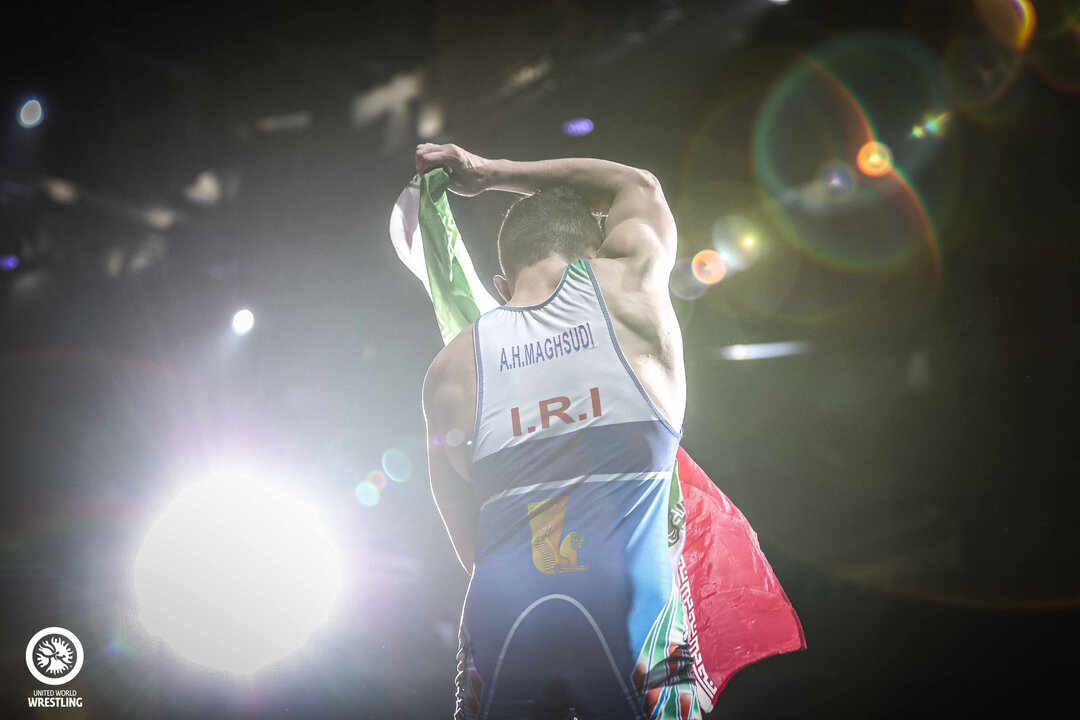 Amirhossein MAGHSOUDI (IRI) improved on his silver-medal finish from last year's World Championships with an 8-4 win over Kurban SHIRAEV (RUS) in the 61kg finals. (Photo: Kadir Caliskan)
Amirhossein MAGHSOUDI (IRI) improved on his silver-medal finish from last year's World Championships with an 8-4 win over Kurban SHIRAEV (RUS) in the 61kg finals. (Photo: Kadir Caliskan)
Amirhossein MAGHSOUDI (IRI) was the second Iranian who carried his nation's flag around the mat after an 8-4 win over Kurban SHIRAEV (RUS) in the 61kg finals.
Maghsoudi was in front 4-0 after a takedown and right-sided gut wrench but nearly gave up the fall after he surrendered a four-point fireman’s carry to his Russian opponenet. Once the Iranian fought off his back, the challenge cube came in from the Russian corner, who was looking for more than four points from Shiraev's fireman’s carry. Russia didn’t get what they wanted and the failed challenge handed Maghsoudi the outright lead, 5-4.
Maghsoudi wrestled a tactical second period -- scoring on three one-point exchanges and improving on his second-place finish from a year ago with the 8-4 victory.
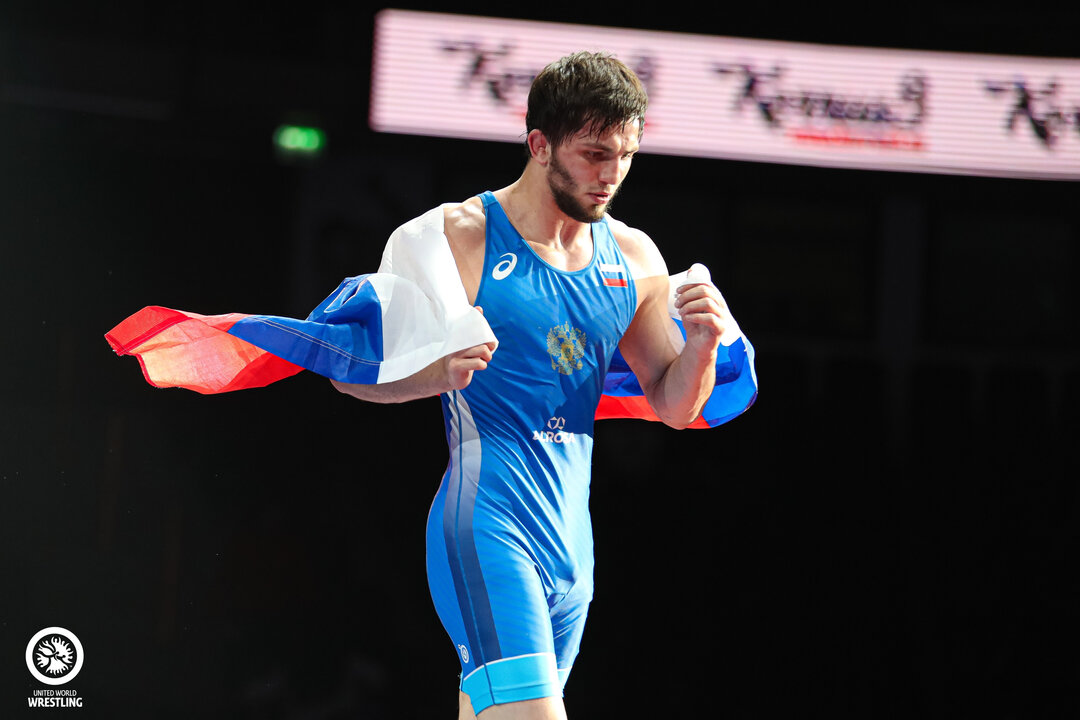 Amkhad TASHUKHADZHIEV (RUS) was the lone Russian to win a world title on Tuesday. He defeated Bagrati GAGNIDZE (GEO), 7-1 in the 79kg finals. (Photo: Kadir Caliskan)
Amkhad TASHUKHADZHIEV (RUS) was the lone Russian to win a world title on Tuesday. He defeated Bagrati GAGNIDZE (GEO), 7-1 in the 79kg finals. (Photo: Kadir Caliskan)
Meanwhile, the Russian Federation, who are cornered by 2014 world champion Abdusalam GADISOV (RUS), lead Iran by 16 points heading into the final day of freestyle wrestling at the Junior World Championships.
Russia’s lone 25-point gold-medal winner was Amkhad TASHUKHADZHIEV (RUS), who tallied a rock-solid six-point victory over Bagrati GAGNIDZE (GEO) in the 79kg finals.
Tashukhadzhiev scored a takedown and a step out in the opening period and carried the 3-1 lead into the second period. Early in the closing three minutes, the Russian launched a series of attacks and scored his second takedown of the bout. While holding onto the four-point lead, Tashukhadzhiev scored his third takedown with a snap down spin behind and reached the top of the world podium for the first time in his career with a 7-1 victory.
Russia also collected 20 points from Kurban Shiraev's 65kg second-place finish, and 30 combined points from Akhmed IDRISOV and Alan KUDZOEV bronze-medal finishes at 57kg and 70kg, respectively.
The other pair of Day 2 gold medals were claimed by Toshiya ABE (JPN) and Erik ARUSHANIAN (UKR), who won titles at 57kg and 70kg, respectively. In the relatively slow-paced 57kg finals, Abe capitalized on a matches’ lone takedown with 15 seconds left to move past Vitali ARUJAU (USA), 2-2 on criteria, while Arushanian scored six unanswered points and edged last year's junior world bronze medalist Vasile DIACON (MDA), 6-5.
Wrestling resumes tomorrow morning with the women's wrestling portion of the tournament kicking off at 10:30 (local time).
RESULTS
57kg
GOLD - Toshiya ABE (JPN) df. Vitali ARUJAU (USA), 2-2
BRONZE - Vrezh GEVORGYAN (ARM) df. Adlan ASKAROV (KAZ), 9-7
BRONZE - Akhmed IDRISOV (RUS) df. Vijay Bajirao PATIL (IND), 10-0
65kg
GOLD - Amirhossein Azim MAGHSOUDI (IRI) df. Kurban SHIRAEV (RUS), 8-4
BRONZE - Turan BAYRAMOV (AZE) df. Ahmet Salim YIGIT (TUR), 8-0
BRONZE - Syrbaz TALGAT (KAZ) df. Vazgen TEVANYAN (ARM), 4-3
70kg
GOLD - Erik ARUSHANIAN (UKR) df. Vasile DIACON (MDA), 6-5
BRONZE - Mohmmadsadegh FIROUZPOURBANDPEI (IRI) df. Ashraf ASHIROV (AZE), 5-4
BRONZE - Alan KUDZOEV (RUS) df. Omer Faruk CAYIR (TUR), 10-7
79kg
GOLD - Amkhad TASHUKHADZHIEV (RUS) df. Bagrati GAGNIDZE (GEO), 7-1
BRONZE - Abubakr ABAKAROV (AZE) df. Arman AVAGYAN (ARM), 6-4
BRONZE - Milan MESTER (HUN) df. Max KASPEROVICH (ISR), 2-0
97kg
GOLD - Abbas Ali FOROUTANRAMI (IRI) df. Yonger Pauli BASTIDA POMARES (CUB), 10-0
BRONZE - Makhsud VEYSALOV (UZB) df. Akash ANTIL (IND), 9-3
BRONZE - Feyzullah AKTURK (TUR) df. Reheman RUSIDANMU (CHN), 11-1

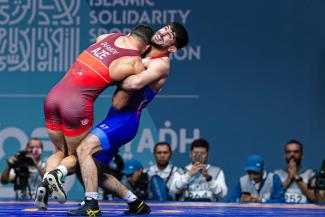
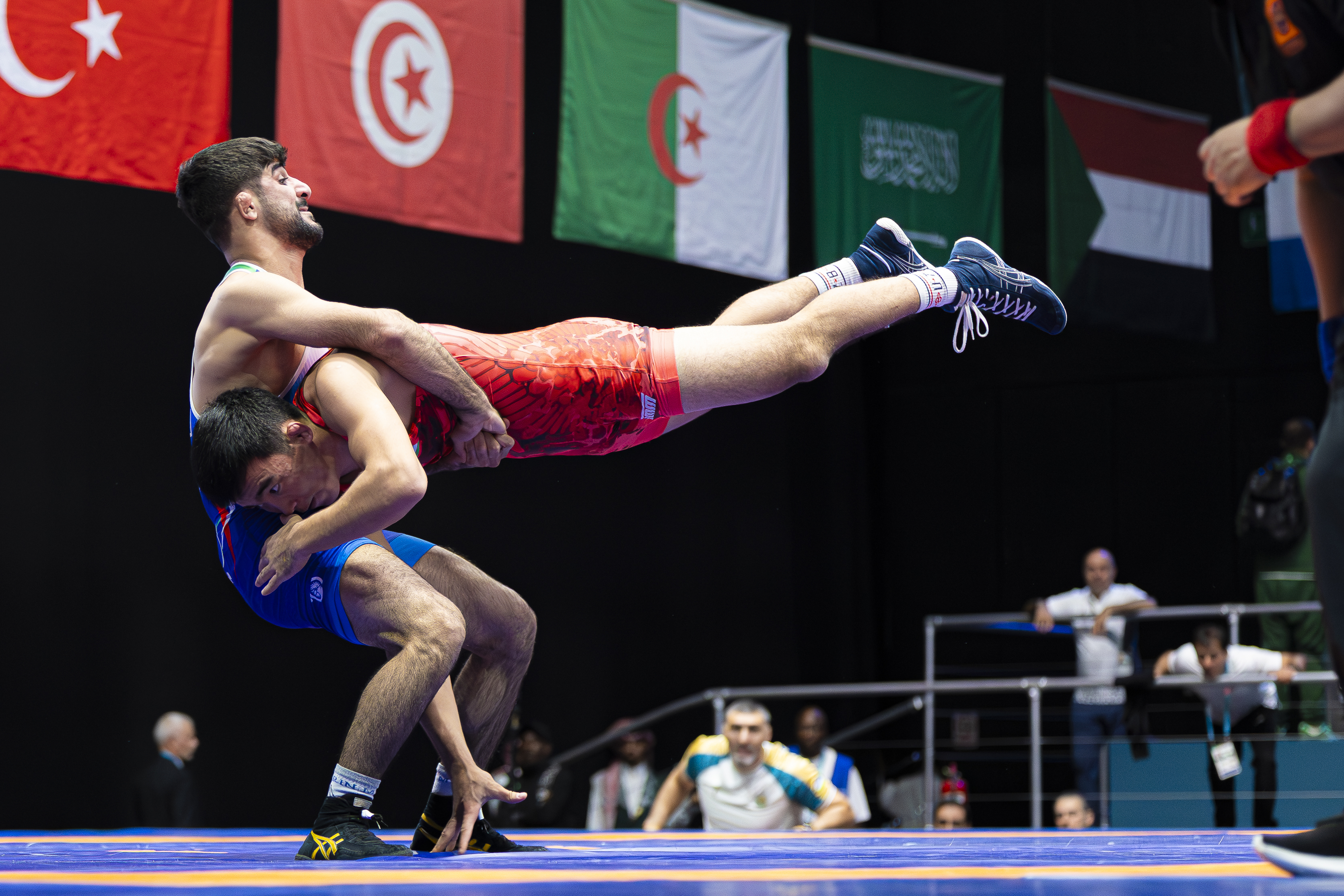 Saeid ESMAEILI (IRI) throws Aytjan KHALMAKHANOV (UZB) during their 67kg bout. (Photo: United World Wrestling / Kadir Caliskan)
Saeid ESMAEILI (IRI) throws Aytjan KHALMAKHANOV (UZB) during their 67kg bout. (Photo: United World Wrestling / Kadir Caliskan)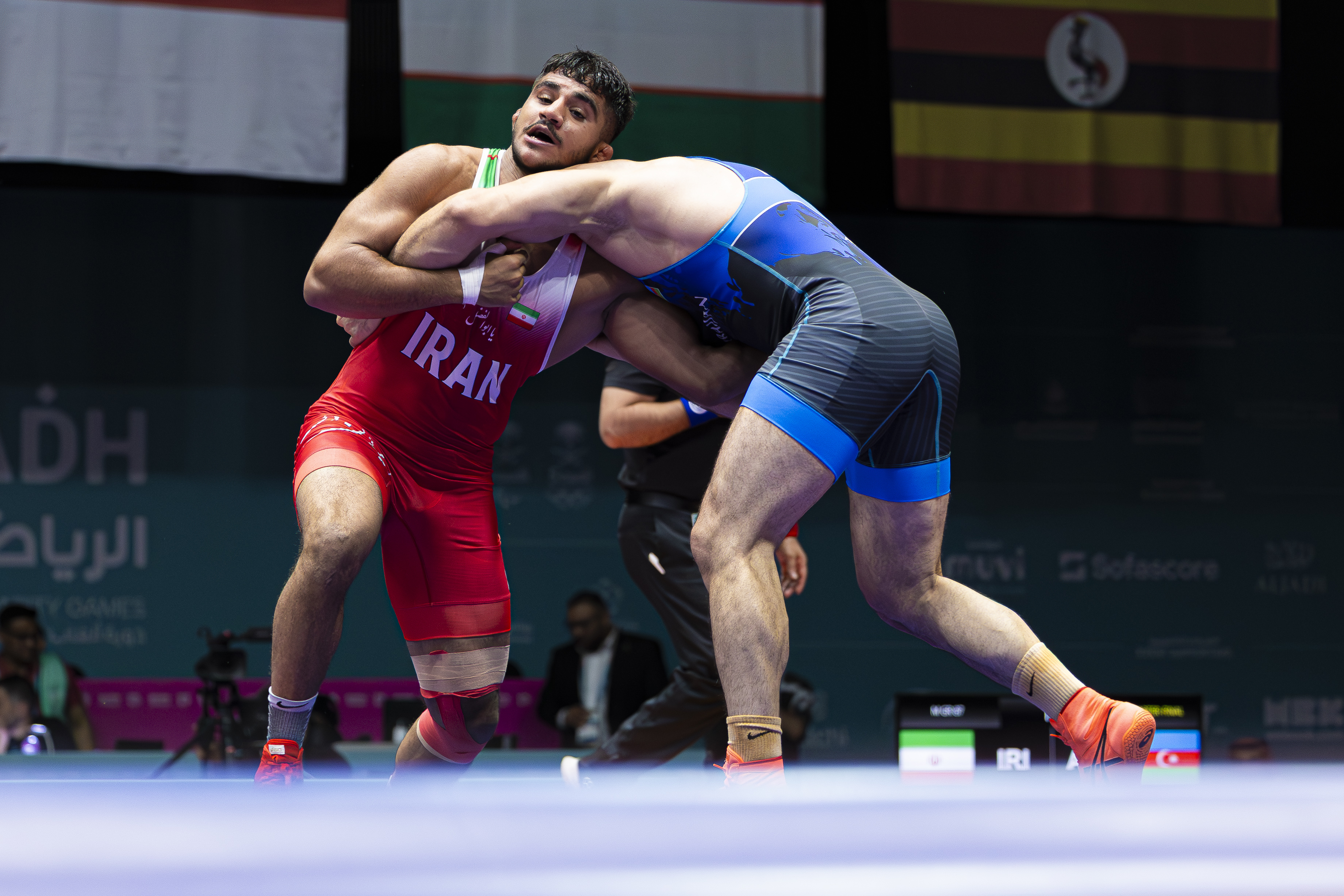 Gholamreza FAROKHI (IRI) won his fourth gold medal this year. (Photo: United World Wrestling / Kadir Caliskan)
Gholamreza FAROKHI (IRI) won his fourth gold medal this year. (Photo: United World Wrestling / Kadir Caliskan)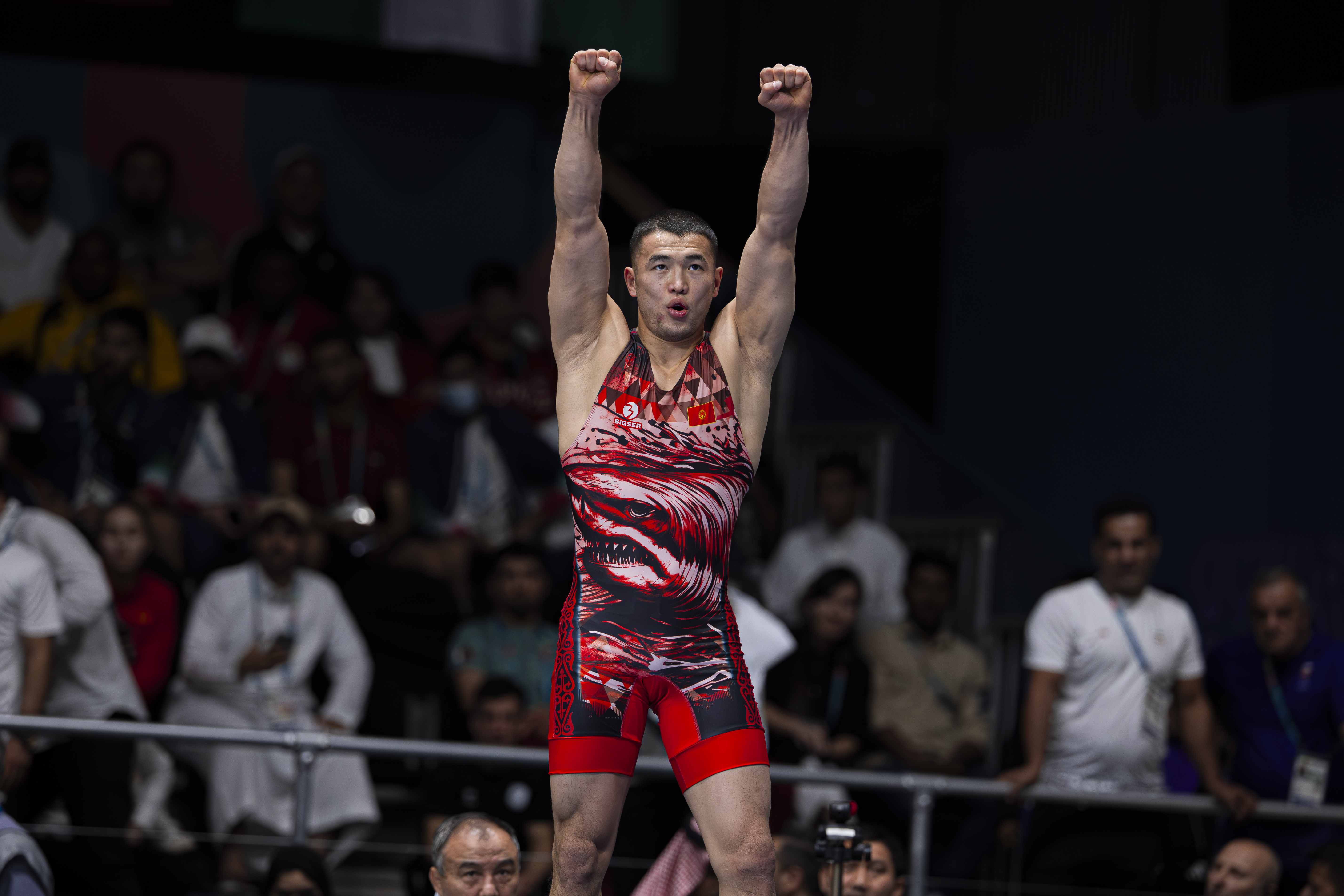 Akzhol MAKHMUDOV (KGZ) won the 77kg gold medal at the Islamic Solidarity Games. (Photo: United World Wrestling / Kadir Caliskan)
Akzhol MAKHMUDOV (KGZ) won the 77kg gold medal at the Islamic Solidarity Games. (Photo: United World Wrestling / Kadir Caliskan)
Share your thoughts.
Comments